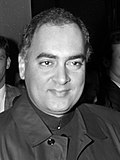This article relies largely or entirely on a single source .(August 2023) |
First Rajiv Gandhi Ministry | |
|---|---|
| 12th ministry of the Republic of India | |
 Portrait of Rajiv Gandhi | |
| Date formed | 31 October 1984 |
| Date dissolved | 31 December 1984 |
| People and organisations | |
| Head of state | Zail Singh |
| Head of government | Rajiv Gandhi |
| Member party | Indian National Congress (Congress alliance) |
| Status in legislature | Majority 353 / 494 (71%) |
| Opposition leader | Vacant |
| History | |
| Election | 1980 |
| Outgoing election | 1984 |
| Legislature term | 2 months |
| Predecessor | Fourth Indira Gandhi ministry |
| Successor | Second Rajiv Gandhi ministry |
| ||
|---|---|---|
(1984–1989) Legislations Treaties and accords Missions and agencies Controversies Wars and attacks Gallery: Picture, Sound, Video | ||
The First Rajiv Gandhi ministry was the 10th union council of ministers of India which was formed on 31 October 1984 after the assassination of prime minister Indira Gandhi. The ministry was headed by Rajiv Gandhi and retained most ministers from the predecessor cabinet.
Contents
- History
- Composition
- Cabinet Ministers
- Ministers of State (Independent Charge)
- Ministers of State
- Deputy Ministers
- References
- External links
The ministry was dissolved on 31 December 1984 after the 1984 general election.

